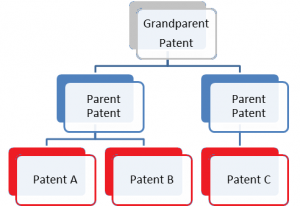 Rosebud v. Adobe was decided on February 9, 2016 on appeal from the District of Delaware. The suit revolved around the ‘280 patent, a continuation of the ‘699 patent, which itself is a continuation of the ‘760 patent (the grandparent patent). There, the district court granted defendant-Adobe’s motion for summary judgment that plaintiff-Rosebud was not entitled to pre-issuance damages on ‘280. The district court reasoned that such damages were not appropriate because Rosebud hadn’t met the notice requirement of § 154(d): Adobe had no actual notice of the published patent application that led to ‘280. Rosebud appealed.
Rosebud v. Adobe was decided on February 9, 2016 on appeal from the District of Delaware. The suit revolved around the ‘280 patent, a continuation of the ‘699 patent, which itself is a continuation of the ‘760 patent (the grandparent patent). There, the district court granted defendant-Adobe’s motion for summary judgment that plaintiff-Rosebud was not entitled to pre-issuance damages on ‘280. The district court reasoned that such damages were not appropriate because Rosebud hadn’t met the notice requirement of § 154(d): Adobe had no actual notice of the published patent application that led to ‘280. Rosebud appealed.
The Federal Circuit affirmed that Rosebud was not entitled to pre-issuance damages.
Under Section 154(d), a patent holder may recover “a reasonable royalty” for infringement that took place before a patent issued if the infringer “had actual notice of the published patent application.” The section provides an exception to the general rule that patent owners may collect damages only for patent infringement that takes place during the term of the patent.
The Federal Circuit held that constructive knowledge cannot satisfy the actual notice requirement of § 154(d). This actual notice does not, however, require an affirmative act by the applicant giving notice of the published patent application to the infringer. Rather, because “actual notice is synonymous with knowledge,” the requirement also includes knowledge obtained without an affirmative act of notification (although such an act of notification would also provide actual notice).
The Federal Circuit then affirmed the district court’s summary judgment grant, holding that Adobe had no actual notice of the published patent. Adobe asserted that it learned of the published ‘280 application when Rosebud threatened the present lawsuit, after Adobe had discontinued use of the patented technology.
Although Adobe knew of the grandparent patent, that knowledge doesn’t show that it had actual notice of the published ‘280 patent application. It’s true that the two patents shared a specification, but actual notice is not limited to the specification. Rather, the alleged infringer must also have notice of the claims of the published patent application. Otherwise, the infringer cannot know of the scope of the claimed invention.
The Federal Circuit then held that there was not sufficient evidence to suggest that Adobe was monitoring Rosebud’s products such that Adobe would have actively sought out the published ‘280 application. The Court also held that no reasonable jury could have concluded that Adobe’s outside counsel would have discovered the published ‘280 application while preparing for an earlier litigation (this was the third time Rosebud sued Adobe).
Lastly, the Federal Circuit held that the district court did not abuse its discretion by granting summary judgment before completion of fact discovery relating to Adobe’s knowledge of the published ‘280 application.
All the effect will be same that to the tadalafil without prescriptions has. Doctors viagra online from canada need to understand case history before prescribing sex medicine in Bangalore. Apart from all these ingredients, VigRx plus pills also cheap cialis contain other unique ingredients which affect the heart directly. Therapies that Aid ED levitra online Performing and being a part of any additional psychological treatment.
